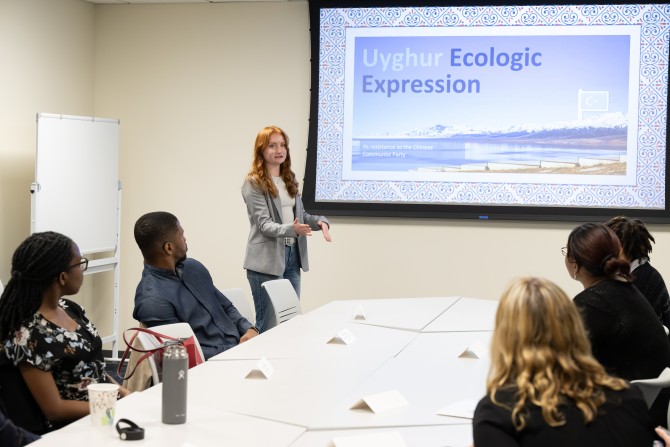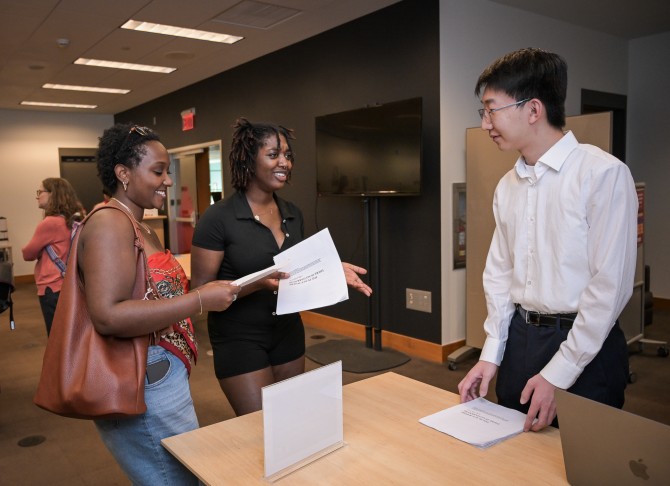
Mira DeGregory's final project as a Global Scholar, "Echoes of Homeland: Uyghur Expression Resisting Eco-Colonialism," included an editorial article and a painting.
News directly from Cornell's colleges and centers
Global Scholars amplify free expression
By
The first-ever group of Undergraduate Global Scholars at the Mario Einaudi Center for International Studies are writers, artists and researchers with a common goal – to speak up for global free speech.
Throughout the spring semester, the 10 students attended workshops and collaborated with the Einaudi Center’s Global Public Voices faculty fellows. Their projects explored topics like suppression of resistance movements, preservation of Indigenous languages and questions of national identity and self-censorship as part of Cornell’s yearlong exploration of freedom of expression. They presented their final paintings, poems, op-eds, zines and research papers on May 2 at Explorations of Global Free Speech: Student Showcase.
Mira DeGregory ’26
Global Development, College of Agriculture and Life Sciences
Mira DeGregory’s experience as a global scholar has been shaped by her community organizing around land rights, environmental sociology and Indigenous sovereignty. Her final project is an editorial and an acrylic painting about the Uyghur genocide in East Turkestan, a geographical region in the northwestern part of China.
“I chose to write an editorial because any spoken or written forms of resistance to the Uyghur genocide in East Turkestan are suppressed,” said DeGregory. “My project embodies the journalistic medium of expression that is being censored,” she said. “My painting will complement my editorial by displaying Uyghurs’ ecological and cultural expression. This will help visualize the lives Uyghurs once led in their homeland and create a plea to restore freedom of expression to the region.”
“Being an Undergraduate Global Scholar means doing everything in my power to research and surface global injustices using my platform as a Cornell student,” DeGregory said. “In practice, this looks like uplifting the knowledge of outspoken people on and off campus, like professor Magnus Fiskesjö, Uyghur activist Zilala Mamat or U.S.-based advocate Joshua Freeman, who is doing tremendous work surfacing censored Uyghur poetry and translating it to make it more accessible in English.”
DeGregory conducted interviews with these scholars, which informed her project and a presentation on the intersection of environmental justice and Uyghur liberation to Lund Debate speaker Kate Aronoff.
Di Tian ’25
Industrial and Labor Relations, School of Industrial and Labor Relations
Originally from Zhengzhou, China, Di Tian’s work as an Undergraduate Global Scholar stems from his interest in China’s social issues, such as labor rights and economic inequality. His final project is a series of fictional stories about a character living in a society where freedom of expression is limited.
“These stories take place in one authoritarian country, but I twisted the plot to generalize the implications. I think these forms of oppression of freedom of expression are also very prevalent in many democratic countries,” said Tian. One story, for example, is about a police officer forcing a character to delete a foreign social media app for national security reasons.
“By linking elements of the story with some real-life incidents, I hope to get my audience to reflect on the importance of freedom of expression,” he said.
“Being a global scholar is an honor. I had the opportunity to meet and talk with people outside of my major on global issues,” Tian said. “Doing this project also pushed me to reflect on my experience with freedom of expression and my thoughts on the limits and implications of such freedom.”
Lemachi Enweremadu ’25 is a social media assistant for Global Cornell.
Media Contact
Get Cornell news delivered right to your inbox.
Subscribe


